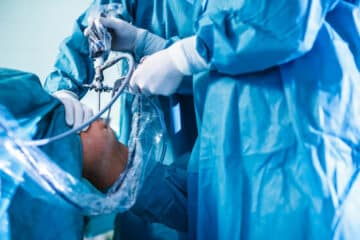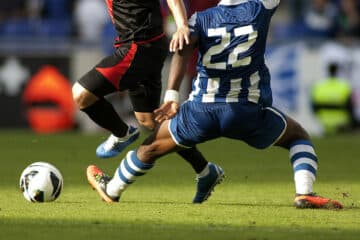
A meniscus tear is a very common source of pain. In our last Expert Series post we explored the cause of most meniscus tears.
The cause of meniscal tears falls under two broad categories:
- Acute, thus following an injury.
- Degenerative, where your meniscus tore simply because it wore out.
Many patients who have knee pain — with or without an injury and are not sure what to do next. Do I see my Doctor? Do I wait?
In this Expert Series post we explore how the cause of your meniscus tear might effect our treatment recommendations and thus help guide your decision on your next steps in managing your painful knee.
Let’s read what our experts have to say.
Dr David Geier: Twitter: @DrDavidGeier ; Website
Acute Tears: Typically the younger, active patients can’t do what they want to do – play their sport or do some type of exercise – so we discuss surgery. We might discuss physical therapy, rest, activity modification and other treatment ideas, but they are often so limited from what they want to do that they choose surgery fairly early in the process.
Degenerative Tears: For people with more degenerative tears, especially with co-existing arthritis, I emphasize trying a course of nonoperative treatment. Anti-inflammatory medications, activity modification, physical therapy and even injections might be options.
Dr Derek Ochiai: Twitter: @DrDerekOchiai ; Website
Initial treatment of meniscal tears: The treatment is dictated by the patient’s symptoms and the condition of the knee cartilage. If an 18 year old basketball player twists his knee and tears his meniscus and the knee is locked (meaning that full knee range of motion is not possible), then that person gets an urgent MRI and probably early knee arthroscopy. If there are no mechanical symptoms (the knee has a smooth range of motion, normal stability), then a period of relative rest to calm down the knee inflammation and beginning physical therapy may be appropriate. Both the medial and lateral meniscus are important for secondary knee stability and diffusing the pounding pressure of weight bearing (acting as shock absorbers), so tears in either meniscus can potentially require arthroscopic intervention.
Dr Jeff Berg: Twitter: @DrJeffBerg ; Website
Usually at initial evaluation, the tear is only suspected but not confirmed. As a result, the tear size, specific location and type are often unknown. In these cases, the initial treatment is usually based on the mechanism of onset (injury or none) and the patient’s age and level of pain or associated symptoms as well as a consideration for any treatments already attempted. If there is not much discomfort or associated symptoms and the patient is approximately >35-40 years old, I will often suggest a trial of rest, anti-inflammatories and either a home exercise program or formal PT. In those who have had a traumatic onset initiating their symptoms, have significant pain, other associated symptoms, such as a loss of motion, particularly straightening their knee or a suspected cruciate injury, I will usually order an MRI to obtain more information.
If the tear characteristics are known, then these characteristics often will come into play in determining a treatment plan. Acute Tears : Acute peripheral, vertical displaced tears are not only usually very painful, they are often repairable if treated more acutely. For this reason, I will usually suggest surgery. I make similar recommendations for acute traumatic radial and root tears in the correct patients. In other tears, I will try to use a treatment that best fits their individual needs (Shared Decision Making Principal). If the patient is younger or has significant pain or has social issues that make a more aggressive treatment preferable, I will proceed with surgery. Degenerative Tears: In all others, I will usually try a course of conservative treatment, particularly in older patients or those with degenerative tears and/or associated knee arthritis. This treatment usually consists of anti-inflammatories, rest and either formal physical therapy or a home exercise program.
Dr Scott Slattery: Twitter: @sportscaduceus ; Website:
Unless the meniscus tear involves a large, displaced piece which can “lock” the knee, the initial management of most meniscus tears is non-surgical. Many patients with knee pain related to a meniscus tear will become asymptomatic within 4-8 weeks with good conservative care. Degenerative tears, especially horizontal tears without displaced pieces, will often not require surgery.
Acute meniscal tears, or chronic degenerative tears with a loose flap can cause mechanical symptoms such as locking, instability and giving way. This always requires a visit to your Sports Medicine Orthopedist. Not only can you injure yourself if the knee gives way, the meniscus plays a very important role in maintaining the proper health of your knee joint.
Do you have questions regarding an Orthopedic injury or longevity?
Do you want to talk to an expert who can listen to you for 45-60 minutes and explain the options in detail?
Dr. Howard Luks offers remote guidance sessions to review your X-ray or MRI images and explain your options.
Dr. Luks has also received hundreds of requests for educational sessions on the topics discussed in his book, Longevity Simplified.
What type of treatments are available for an acute meniscus tear which is unstable, or a chronic tear which produces minimal pain and no mechanical symptoms? That is the focus of our next Expert Series post.
Stay tuned…













Kim Bainter
Doctor, I am 59 and have a severe radial meniscus tear, I see a doctor on March 21st, I have been resting it for 2 weeks and my knee still can’t bend and I am in pain, will I need surgery? I can’t live like this, I am very active and at my job I walk all day. Thank you ……Kim
Martin
Hi Dr. Luks,
You have a very informative website, thanks for the all the information.
My MRI results says;
posterior horn medial meniscus tear grade 3 tear
anterior horn lateral meniscus joint focal tear
I don’t have any problems on my daily life activities, only when I do this movement; left ankle on right knee like this picture(http://0.tqn.com/d/exercise/1/S/G/j/seatedhipstretch.jpg), there is mild but sharp pain in my inner knee. First I felt this pain while trying to put of my boots on same position but while I’m standing instead of sitting (what a stupid way to tear a meniscus).
I’m a 28 years old male, (6 feet 2 inch, 185 pounds). I have seen two doctors, one said go without surgery, other one said you need surgery and he will remove tear part. I’m confused and I don’t want to have surgery. What is your opinion on my me?
Do you have any suggestions for physical therapy. I was considering squats to strengthen my muscles to stabilize my knee, do you think it is bad for me?
Best
It doesn’t seem like your quality of life is being significantly altered by the pain you are experiencing. Non surgical options are certainly on the table.
Henry
Also, if you don’t mind, could you provide a recommendation for a surgeon in the southeastern US who routinely performs root repairs? Thanks…
Henry
Dr. Luks, thanks for getting back to me and offering advice. When I previously talked with my doctor, he said that the root is apparently only partially torn. I will try to find a surgeon who will perform a root repair, but if I were to have a partial meniscectomy that left a portion of the root attached, would that still leave the entire meniscus in a nonfunctional state? In other words, is the entire meniscus nonfunctional if only a portion of the root is torn and removed?
Henry
Dr. Luks,
I injured my knee while running (although I don’t remember any specific injury) and am trying to decide on what the best option regarding surgery is. The surgeon I had an appointment with suggests a partial meniscectomy. If you don’t mind taking a look at it, the MRI report is quoted below:
“The ACL and PCL are intact. The medial meniscus is intact without evidence of tear. There is a focal tear of the posterior horn of the lateral meniscus at the posterior root attachment without any meniscus attaching in this location. There are no displaced meniscal fragments. The MCL complex and the lateral supporting structures are intact. The patellofemoral articulation is congruent. The quadriceps tendon and patellar tendon are intact. There is susceptibility artifact at the patellar attachment on the tibia, possibly related to prior surgery (note: I have never had surgery). The cartilage of the knee is preserved throughout. There is no evidence of acute fracture or aggressive appearing osseous lesion. Trace fluid is seen within the joint. There is no significant popliteal cyst.
Impression: Focal tear of the posterior root attachment of the lateral meniscus. Otherwise no acute left knee pathology.”
The orthopedic surgeon I saw said that I essentially have a partial tear of the posterior meniscal root in my left knee. His suggested treatment is to perform a partial meniscectomy to remove/debride the torn portion, and he stated in his notes that he doesn’t feel that it will be necessary to perform a root repair “per se.” Can I ask if you agree, in your professional medical opinion, with his assessment? Do you think it would be better to seek out an orthopedic surgeon who would prefer to perform a root repair?
Thank you for your time; any assistance you’d be willing to provide would be sincerely appreciated.
Hi Henry … Root tears are almost always repairable. They are more difficult to repair so many do not try it. If you have a partial meniscectomy, or if the root is completely detached, then the entire meniscus is nonfunctional and the knee will likely become arthritic. I would start looking for someone who performs root repairs routinely.
Good Luck
Howard Luks